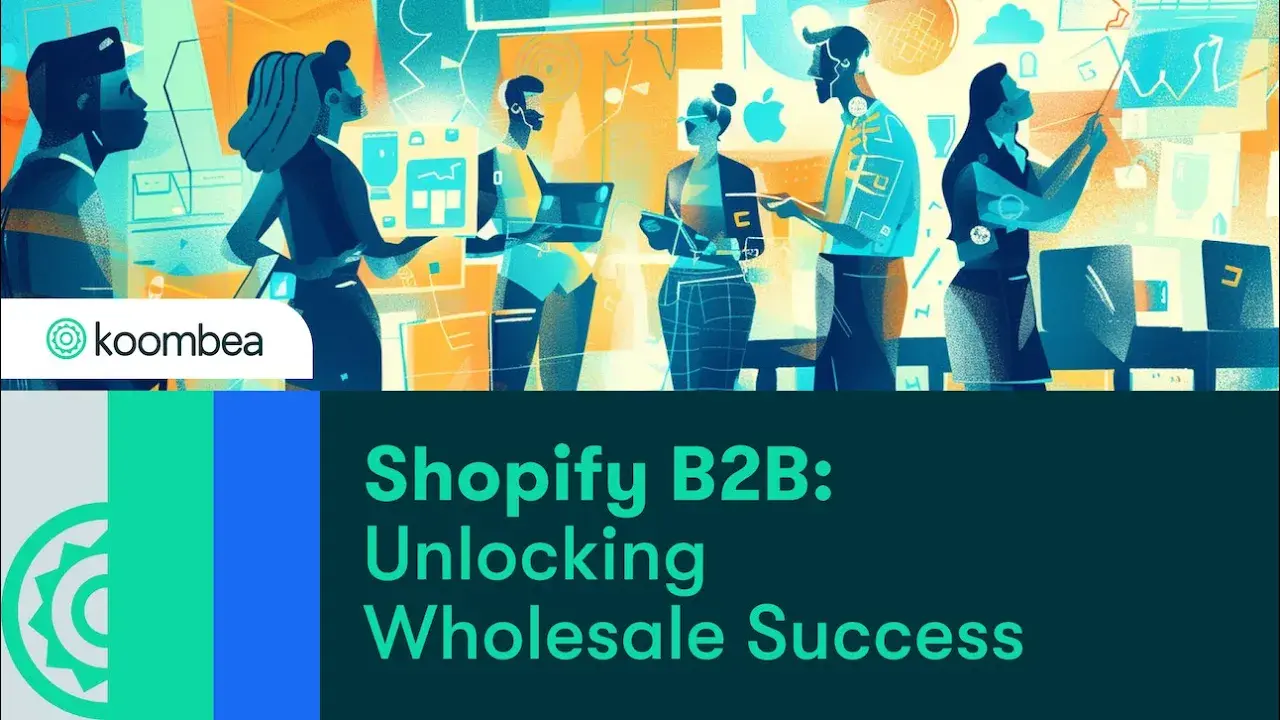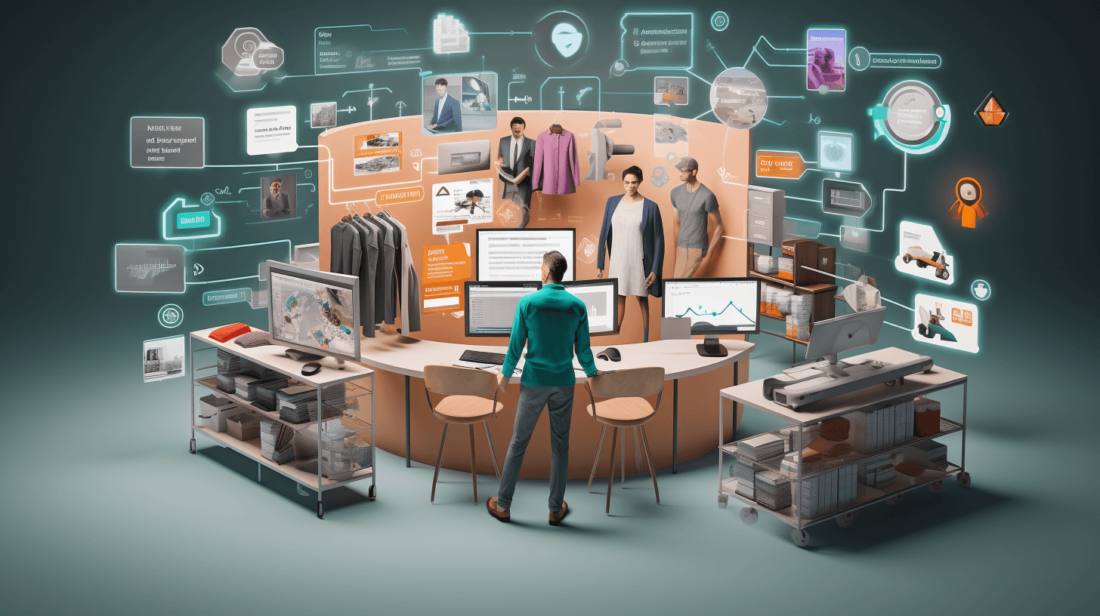
Thinking about using Shopify B2B for your wholesale enterprise? This article dissects the Shopify B2B platform’s ability to streamline B2B transactions with custom pricing strategies, illustrating how to efficiently manage your Shopify B2B wholesale operations and customer relationships, ensuring that your customers remain at the forefront of your business strategy.
Key Takeaways
- Shopify’s B2B Ecosystem, including Shopify Plus, offers powerful tools tailored to manage wholesale operations efficiently, with custom pricing options at the forefront.
- Social media has become a pivotal B2B marketing channel, with strategies for B2B involving engaging content, customer testimonials as social proof, and sustainability in operations and packaging to build brand trust and loyalty.
- Technological advancements in Shopify B2B, like AI for personalized experiences and headless commerce, provide flexibility for a tailored front-end, while the mobile-first approach and self-service options cater to the evolving expectations of B2B buyers.
Understanding Shopify B2B Ecosystem

Shopify’s B2B Ecosystem, designed for the online store market, is a robust platform specifically honed to meet the demands of digital B2B store transactions and capitalize on the market prospects. Shopify B2B, with its robust third-party app integration and advanced account management features, became an essential tool within B2B eCommerce in 2023. This was particularly true for those looking to sell wholesale to DTC customers, as digital sales through B2B channels experienced a significant increase, growing by 17% to reach approximately $2.1 trillion.
Shopify offers specialized B2B features, including wholesale features such as custom pricing and payment terms focused on activities tailored to wholesale customers, simplifying the setup process and routine merchant management. These wholesale features enhance Shopify’s stature as a key entity in facilitating eCommerce operations across businesses, especially for those targeting wholesale customers and looking to restrict access to exclusive pricing and products.
The Role of Shopify Plus in B2B Commerce
The advanced B2B eCommerce platform of Shopify Plus is crafted to assist brands in expanding their wholesale business effectively. The “Plus Subscription” of Shopify offers advanced capabilities, including creating multiple price lists to establish different pricing tiers for various customer groups and custom themes specifically crafted to meet the unique requirements of B2B commerce.
Shopify’s eCommerce solution, commonly called the Shopify platform, seamlessly integrates operations across wholesale and retail sectors within a single interface. It obviates the necessity for additional software or programming work. By incorporating this combination of capabilities, including wholesale pricing options, Shopify Plus becomes an invaluable resource for merchants who operate in the digital realm, seeking growth and prosperity in their wholesale business.
Streamlining Wholesale Operations with Shopify
Running a wholesale business demands operational efficiency, and the Shopify B2B eCommerce platform excels in this regard by offering features such as automated bulk order processing, assigning payment terms, and the ability to manage orders—all critical for successfully managing B2B transactions in any online wholesale store. With Shopify B2B, businesses can further enhance their B2B wholesale store capabilities by utilizing custom pricing strategies such as ‘checkout to draft,’ allowing easy oversight and approval of orders via the Shopify admin portal, and integrating with third-party apps for extended functionality, making it a go-to solution for B2B wholesalers.
Shopify enables round-the-clock access to your wholesale channel, serving customers across different time zones and ensuring that your company location does not restrict your ability to control and manage your wholesale channel. Retail companies are empowered to establish a distinct B2B wholesale channel on the platform—this segmentation from direct-to-consumer sales streamlines specific functions pertinent to wholesaling. Leveraging these tools within Shopify’s ecosystem, your company, regardless of its company location, can proficiently manage its wholesale channel activities directly from your preferred location, ensuring you can focus squarely on expanding your enterprise.
Leveraging Social Media for B2B Engagement

No longer is social media exclusively the domain of B2C enterprises. A striking 87% of businesses in the B2B sector now consider social media an integral and highly effective part of their marketing strategies. When surveyed, a vast majority—79% to be precise—of content marketing experts specializing in B2B rated social media as the most potent channel for their marketing efforts.
Social media offers a vital platform where businesses operating on a B2B model can engage with potential customers, create and share relevant content efficiently, boost their visibility and brand recognition effectively, and deliver customer support proactively, all while highlighting their custom pricing capabilities to DTC customers and enhancing their selling strategies.
Crafting Compelling Product Showcases on Social Platforms
To effectively display products on B2B social networks, aligning your social media strategies with broader company objectives, such as boosting brand recognition or building trust, is essential. Understanding the company and intended audience is important to craft content that resonates deeply. For B2Bs specifically, LinkedIn reigns supreme as an organic platform.
Businesses can maintain regularity and high post standards by devising a content calendar and assembling a material repository. Several tactics are recommended to make their brands resonate with their business customers.
- Injecting humor into communications
- Participating actively in pertinent discussions
- Presenting key insights and infographics succinctly for easy comprehension and sharing
In terms of video marketing, the B2B sector encompasses various formats, such as:
- Instructional how-to guides
- Explainer videos detailing product use or concepts
- Insider glimpses through behind-the-scenes footage
- Product unboxing demonstrations
- Client endorsements
Maintaining frequent updates with concise video clips greatly enhances customer engagement, and creating genuine material does not require elaborate setups. Even smartphones suffice to generate sincere visuals.
Building Trust Through Customer Testimonials
Utilizing social media to display customer success stories and endorsements is a tactical method for demonstrating expertise and cultivating trust with future B2B customers, purchasers, and specific customers. As powerful ‘social proof,’ these testimonials are central in influencing potential customers’ psychological tendency to emulate others’ successful actions, thus diminishing their reluctance to purchase.
Sharing high-quality testimonials on platforms like Facebook or LinkedIn enhances a brand’s image by underscoring its record of delivering satisfaction—a critical element of trust for businesses operating in B2B markets. Since B2B clients seek substantiated and relatable content on these networks, incorporating thorough accounts from satisfied customers becomes indispensable to producing authentic and compelling material.
Sustainability: A Competitive Edge in B2B

In B2B commerce, sustainability is becoming an increasingly important factor that sets businesses apart. Buyers are inclined to favor suppliers who provide sustainable and environmentally friendly products, which corresponds with their overarching goals related to corporate social responsibility.
In business-to-business dealings, customers exhibit a greater fidelity to companies that show ecological awareness. This shift in consumer attitudes affects how merchants operating on Shopify plan out their operational methods and marketing tactics.
Green Practices in Supply Chain and Packaging
Many multinational corporations have committed to integrating eco-friendly practices throughout their online store supply chains, a crucial step in addressing economic, social, and environmental challenges. This reflects the increasing importance of sustainability in contemporary online store business operations. To adopt sustainability effectively throughout B2B supply chains for online stores, it is recommended to pursue long-term objectives and include every level of supplier involvement within the scope of a comprehensive sustainability plan.
The following materials are recognized as environmentally friendly options for packaging in business-to-business transactions:
- Paper
- Cardboard
- Glass
- Select plastics that are either readily recyclable or biodegradable
For businesses aiming to market their initiatives on eco-friendly packaging effectively, it’s important to accentuate the employment of recycled materials that can naturally break down over time or are derived from renewable resources. Doing so enhances attractiveness for B2B clients prioritizing ecological considerations in their procurement decisions.
Marketing Your Eco-Friendly Approach
By implementing sustainability standards from the Responsible Business Alliance, businesses demonstrate their commitment to unified sustainable practices. Utilizing international platforms such as the UN Global Compact and openness programs like the Carbon Disclosure Project’s Supply Chain Program in marketing efforts underscores a company’s dedication to environmental transparency.
Insisting that primary suppliers devote funds to minority-owned enterprises within sustainability objectives emphasizes diversity and social accountability in B2B relations. Establishing preferred-supplier programs encourages sharing superior methods for maintaining sustainability, thereby strengthening credibility when promoting these endeavors to B2B customers.
Personalized Experiences with Shopify’s B2B Tools

Shopify’s B2B instruments enable customized experiences for wholesale customers through personalized pricing, special payment terms, and dynamic content powered by AI and predictive analytics, catering to the unique needs of different customers.
AI technology is increasingly prevalent in delivering individualized experiences for wholesale customers in B2B eCommerce on Shopify, including custom pricing, personalized product recommendations, targeted marketing messages, and flexible payment terms through the Shopify admin interface.
Custom Pricing and Exclusive Offers
Shopify offers a variety of wholesale pricing strategies tailored for B2B merchants to engage and maintain their wholesale customer base, such as:
- Wholesale pricing that matches or undercuts competitors
- Wholesale pricing according to the perceived value
- Adjustable wholesale pricing in response to demand and costs
- Wholesale pricing is designed to appeal to customers’ emotions or perceptions
- High-end wholesale pricing denoting superior quality
- Strategically lower wholesale prices on certain items with an expectation of profiting from additional sales
- Wholesale prices set at reduced rates are typically reserved for bulk purchases
When economic constraints lead B2B buyers to become more price-sensitive to wholesale pricing, Shopify provides tools enabling sellers to restrict access to special pricing. These tools can dynamically adjust wholesale prices per fluctuating market trends and rival offerings, allowing vendors to protect their margins while fostering long-term loyalty amongst clients and maintaining a competitive edge.
Dynamic Content and Predictive Analytics
Shopify Plus empowers business owners to create customized interactions within their blended store, utilizing artificial intelligence-driven recommendations and customer reviews. This approach helps build confidence and fosters lasting relationships with customers.
Through Shopify’s analytics tools, merchants can monitor different segments of customers as well as gauge the performance of various marketing avenues. These metrics are vital for informed decision-making in strategic planning for their store.
Mobile-First Strategy for B2B Success

To stay ahead in the rapidly growing mobile commerce arena, B2B companies must prioritize a mobile-focused strategy. This shift towards adopting a mobile-first mindset is crucial as it yields improved conversion rates and bolsters customer loyalty for these businesses, given that consumers increasingly rely on mobile devices.
Designing for Mobile Shoppers
Creating content that responds well to smaller screens is crucial to boosting user involvement and decreasing the likelihood of prematurely leaving a site. By simplifying the checkout process and transparently revealing any extra fees from the outset, mobile transactions become more seamless, reducing the chances of shoppers abandoning their carts. Enhancing the mobile experience involves limiting access to non-essential distractions on handheld devices.
Mobile Payment Processes Made Simple
To minimize cart abandonment while simultaneously gathering customer data, it is advisable to provide a guest checkout feature and suggest account creation after completing the purchase. For a swift and effective mobile checkout experience, utilizing Shopify’s native system or leveraging third-party applications such as Shop Pay is suggested.
Empowering Buyers with Self-Service Portals
There is an increasing movement within B2B eCommerce toward self-service, with buyers wanting the ability to manage their purchases, interactions, and payment terms independently, regardless of their company location. Shopify provides an online store platform for B2B companies to offer experiences similar to a DTC store, including custom pricing, flexible payment terms, and comprehensive order history through self-service portals.
Features of a Self-Service B2B Portal
Shopify offers a variety of pricing strategies, discounts, and flexible payment terms tailored for B2B merchants to engage and maintain their customer base, adapting to their financial workflows.
Recognizing the preferences of a younger generation, with millennials making up 73% of B2B decision-makers, Shopify’s self-service B2B portal delivers an experience tailored to their desire for personalized and effortless online shopping.
Implementing Self-Service for Enhanced Customer Autonomy
Merchants operating on Shopify can use dedicated B2B functionalities built into the platform, allowing them to create and oversee a self-service B2B portal through the Shopify admin. These capabilities are meticulously crafted to fulfill the preferences of wholesale clientele, progressively opting for digital or efficient human interactions when managing business dealings, granting them autonomy and efficiency within the Shopify admin interface.
Headless Commerce: The Future of B2B Flexibility
Headless commerce represents a structure in eCommerce that decouples the back-end infrastructure from the front-end presentation layer. This separation allows businesses to alter elements facing the customer without impacting the back-end systems. The key advantage of this approach is its flexibility, which empowers businesses to adapt and stay ready for technological shifts within commerce swiftly.
Advantages of Going Headless on Shopify
Utilizing headless commerce through Shopify can boost site functionality with quicker page loads, enriching the user experience and potentially leading to a rise in sales.
By adopting a headless architecture, businesses gain more scalable platforms where alterations to the user interface have no impact on the underlying eCommerce mechanics. This separation is vital for companies aiming to expand and evolve seamlessly.
Integrating with Multiple Channels
Headless commerce from Shopify enables businesses to create varied and adaptable buying experiences tailored for B2B customers and incorporate a range of reliable instruments and systems, including ERPs, PIMs, CRMs, and CMSs. It also simplifies the integration with several sales channels. It allows for effective data management and reuse across different platforms, such as mobile devices, smartwatches, and voice-activated apps, while maintaining a uniform user experience.
Engaging B2B Audiences with Rich Media Content
In the B2B sector, there is a notable shift towards utilizing video advertising and sophisticated content marketing strategies. This trend reflects the expectations of B2B buyers for personalized, immediate, and interactive purchasing experiences that rich media content inherently provides.
Video Marketing Tactics for B2B Brands
For B2B brands to craft successful video content, they must grasp the intended audience’s requirements, desires, and obstacles. Clear messaging and decisive calls to action in ineffective B2B video marketing are critical for steering viewers toward subsequent actions, such as investigating products or purchasing.
Incorporating Interactive Content for a Dynamic Storefront
Utilizing interactive elements like quizzes, calculators, and augmented reality can enhance the B2B shopping experience on Shopify by making it more dynamic and engaging. These types of content could include a variety of formats such as polls, games, animated infographics, interactive maps, or videos—all aimed at captivating users and fostering an immersive atmosphere.
AI Innovations on Shopify for Advanced B2B Selling
AI technology is becoming increasingly prevalent in providing personalized experiences on Shopify for B2B eCommerce, which includes offering tailored product recommendations and bespoke marketing messages.
Leveraging predictive analytics with AI integration on the Shopify platform empowers B2B merchants to make informed decisions about their store inventory management, ultimately streamlining their supply chain processes.
Personalizing B2B Journeys with AI
Shopify Plus leverages Artificial Intelligence (AI) to elevate the B2B e-commerce experience, providing merchants with capabilities such as:
- Customized payment and delivery options at checkout
- In-depth data analysis utilizing ShopifyQL Notebooks for comprehensive insights
- Intelligent product suggestions tailored through smart commerce queries
These AI-driven features give Shopify Plus merchants a significant edge by optimizing their e-commerce activities.
Predictive Insights for Better Inventory Management
Merchants operating in the B2B sector on Shopify can employ AI Inventory Management applications like Assisty’s offerings, which are specifically tailored for sophisticated inventory forecasting and allow for personalized report generation.
To accommodate the unique needs of diverse businesses regarding tracking and managing their inventory, these AI Inventory Management tools support customized reporting options.
Embracing 2024’s B2B eCommerce Trends on Shopify
Understand the shift towards autonomous purchasing experiences, with B2B buyers expecting a level of self-service and ease similar to what they receive in B2C dealings.
Realize the importance of prioritizing a mobile-focused approach due to the considerable volume of B2B transactions conducted through mobile devices.
Adapting to New Buyer Behaviors and Preferences
By 2025, digital channels will host 80% of B2B sales interactions, indicating a considerable move towards online environments where businesses can sell wholesale. Consumers’ shopping habits after the pandemic are shifting to favor products that provide comfort and wellness, and Shopify is equipping merchants with the tools to highlight and sell these trends effectively.
Utilizing Shopify’s Newest Features for B2B Growth
With the rollout of new features, Shopify Plus merchants can comprehensively customize their checkout experience, enhancing B2B operations and customer satisfaction through seamless integration with a third-party app.
To cater to wholesale customers across the globe, Shopify Plus has unveiled features for global expansion. These include options for localized storefronts, various currencies, and tax exemptions aimed at facilitating international transactions.
Frequently Asked Questions
Can Shopify be used for B2B?
Certainly, Shopify provides a versatile solution for B2B eCommerce that accommodates merchants looking to delve into wholesale and exclusively serves the intricate demands of B2B businesses as they grow.
How much does Shopify B2B cost?
Accessing B2B features on the Shopify Plus plan requires an investment of $2000 per month, offering specialized functionalities tailored for operations, including advanced account management tools.
Is Shopify B2B good?
Indeed, Shopify serves as an excellent platform for creating B2B stores. It delivers all the necessary features for efficient order and customer management while presenting a range of third-party apps to tailor your store’s functionality.
What is the difference between B2B and B2C Shopify?
The primary distinction between B2B and B2C Shopify lies in the intended demographic. Where B2C is designed for selling straight to individual customers, B2B caters to transactions with other businesses.
How does Shopify cater to B2B businesses?
Shopify provides a specialized platform solution for online B2B commerce operations called Shopify Plus, designed to support businesses with its array of advanced features tailored to their needs.
Summary
In summary, Shopify provides all the features needed, offering an extensive toolkit designed to meet the distinct demands of businesses operating within the B2B wholesale sector. This comprehensive approach makes Shopify good for business, as it offers tailored experiences enriched with AI advancements, a mobile-centric approach, and self-managed platforms. It equips merchants with the capabilities to deliver an exceptional shopping journey to their many B2B wholesale customers. No matter your business’s scale or reach, adopting cutting-edge trends in Shopify B2B eCommerce through Shopify can be instrumental in fostering expansion, achieving success, and securing a competitive advantage in the ever-evolving digital marketplace.
Koombea, a renowned Shopify Plus Partner, brings a wealth of experience with Shopify platforms. Our team of expert Shopify developers is dedicated to crafting custom Shopify solutions that streamline your operations, elevate the user experience, and amplify your growth potential. Reach out to us and learn how we can tailor your Shopify B2B strategy not just to meet, but exceed your business aspirations.
